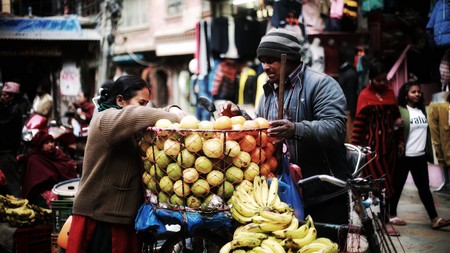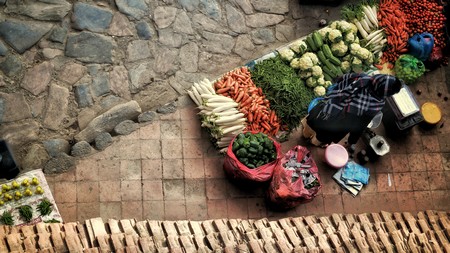Verandering in eetpatroon nodig om klimaatopwarming af te remmen
Wanneer we de uitstoot van broeikasgassen in de voedselketen niet aanpakken zullen onze pogingen om de aarde te beschermen tegen de gevolgen van klimaatverandering onvoldoende effect hebben. Voedsel is nu verantwoordelijk voor een derde van alle door de mens geproduceerde broeikasgassen. De grootste toename in uitstoot vindt plaats door consumptie van rundvlees en melkproducten in snel ontwikkelende landen als China en India. Om de klimaatverandering af te remmen is het belangrijk consumenten aan te moedigen om voedingsproducten te kiezen die een lagere uitstoot veroorzaken.
Deze resultaten van een internationaal team van wetenschappers, onder leiding van de RUG en de Universiteit van Birmingham, zijn op 15 juni gepubliceerd in het tijdschrift Nature Food. De onderzoekers berekenden de zogeheten consument-gebaseerde emissies, waarbij de uitstoot van productie tot aan de consumptie is opgeteld, wat een waarde oplevert die onafhankelijk is van de productieplek. Dit deden zij voor 153 verschillende voedingsmiddelen in de voedselketen (op zowel dierlijke als plantaardige basis) in 181 landen, over de periode 2000 tot en met 2019.

Bevolkingsgroei
De jaarlijkse uitstoot van broeikasgassen door voeding nam in deze periode van twintig jaar toe met 14 procent (2 gigaton CO2-equivalent). De sterke toename van voeding op dierlijke basis was verantwoordelijk voor ongeveer 95 procent van de totale toename in broeikasgassen, en voor de helft van de totale door voedsel veroorzaakte uitstoot. Rundvlees en melkproducten droegen respectievelijk 32 en 46 procent bij aan de toename in de wereldwijde door dieren veroorzaakte uitstoot.
De VN verwacht dat de voedselproductie met ongeveer 70 procent moet stijgen in de periode tot 2050 vanwege de verwachte bevolkingsgroei tot 9,1 miljard mensen. Zowel de groei van de bevolking als de groeiende vraag naar voedsel dat een hoge uitstoot veroorzaakt zullen de totale uitstoot vergroten. ‘Een wereldwijde verandering van het voedingspatroon, waarbij de hoge consumptie van rood vlees wordt teruggebracht en mensen meer plantaardige eiwitten gaan eten is nodig. Dat zal niet alleen de uitstoot verminderen, maar ook gezondheidsrisico’s zoals overgewicht en hart- en vaatziekten’, zegt mede-auteur Klaus Hubacek, hoogleraar Science, Technology and Society aan de RUG.
Auteur Yuli Shan van de universiteit van Birmingham merkt op: ‘De agrifood sector vergroot het wereldwijde gebruik van grond voor landbouw. Die sector is verantwoordelijk voor ongeveer een derde van de door mensen geproduceerde broeikasgassen. Bevolkingsgroei, een grotere voedselproductie en een toename van dierlijk voedsel verhogen de uitstoot verder, waardoor het budget aan koolstof dat we kunnen uitstoten snel op raakt.’

Handelsverdragen
Eerste auteur en RUG promovendus Yanxian Li voegt er aan toe dat we de uitstoot in alle stappen van de voedselvoorziening, van productie tot consument, moeten aanpakken als we de opwarming van de aarde binnen de perken willen houden. ‘Maar het is erg lastig om snel een breed gedragen en blijvende veranderingen in het voedingspatroon te bewerkstelligen. Daarom moeten er beloningen komen voor consumenten die hun consumptie van rood vlees verminderen of producten kopen die beter zijn voor het milieu en uitstoot van voeding verminderen.’
De onderzoekers merken ook op dat een aantal handelsverdragen de uitstoot van broeikasgassen juist vergroten door een verhoogde import van voedsel uit landen en regio’s die voedsel produceren met een hoge uitstoot. De Green Deal van de EU richt zich bijvoorbeeld op minder intensieve landbouw in Europa, maar daardoor kan de import van landbouwproducten uit landen zoals Brazilië, de VS, Indonesië en Maleisië verhogen. Dit kan leiden tot een verhoging van de uitstoot van broeikasgassen.
Referentie: Yanxian Li, Honglin Zhong, Yuli Shan, Ye Hang, Dan Wang, Yannan Zhou and Klaus Hubacek: Changes in global food consumption increase GHG emissions despite efficiency gains along global supply chains. Nature Food, 15 juni 2023
Tekst: University of Birmingham, RUG
Meer nieuws
-
17 februari 2026
De lange zoektocht naar nieuwe fysica
-
10 februari 2026
Waarom slechts een klein aantal planeten geschikt is voor leven
